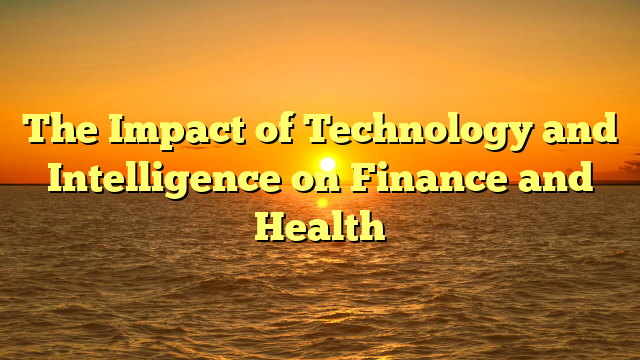—
As technology evolves, industries such as finance, health, and artificial intelligence are becoming more interconnected, each benefiting from cutting-edge innovations. In this article, we will explore how these domains are intersecting and the significant role they play in shaping our lives and society.
The Evolution of Finance in the Age of Technology
The advent of technology has brought about a new era in finance, with innovations such as mobile banking, digital payments, and cryptocurrencies becoming commonplace. Technology has made it easier for individuals to manage their finances, access loans, and invest in various assets. Additionally, AI tools are being used to automate financial decision-making, allowing for better risk management and smarter investment opportunities.
Machine learning, a subset of AI, is particularly impactful in investment and risk management. By analyzing historical data, AI tools can predict market trends, making it easier for investors to make informed decisions. Additionally, AI-based credit scoring systems are reducing the bias that often exists in traditional credit scoring models, enabling more people to access loans and financial services.
How Technology is Enhancing Human Intelligence
Artificial intelligence is also playing a significant role in enhancing human intelligence. AI-driven learning platforms are helping individuals acquire new skills faster, while cognitive assistants are aiding decision-making processes by providing real-time data and insights. These technologies are particularly useful in high-stakes fields such as medicine, where quick and accurate decisions are crucial for patient outcomes.
In addition to artificial intelligence, brain-computer interfaces (BCIs) are a technology that is enhancing human cognition. PBOWIN allow for direct communication between the brain and external devices, which can be used for various purposes, from controlling prosthetic limbs to assisting individuals with neurological disorders. These technologies are offering new possibilities for those with cognitive impairments, providing them with ways to interact with the world in ways that were once unimaginable.
Health and Technology: Improving Outcomes with Innovation
The health sector has witnessed a digital revolution in recent years, with technology transforming how medical professionals diagnose and treat patients. Telemedicine, remote monitoring, and AI-driven diagnostic tools are improving the quality of care while reducing costs. Additionally, technologies like wearable health trackers and mobile health apps allow individuals to manage their wellness and detect health issues before they become critical.
The integration of AI in healthcare has the potential to reduce medical errors and improve outcomes. Machine learning algorithms can help doctors make better decisions by analyzing large datasets of medical information and identifying trends that might not be immediately apparent. Furthermore, the use of AI in drug discovery is accelerating the development of new treatments, offering hope for patients with conditions that currently have no cure.
Conclusion
In conclusion, the integration of technology into finance, healthcare, intelligence, and cognitive enhancement is driving unprecedented change across all sectors. As we move forward, the continued development of AI, blockchain, wearable health devices, and brain-computer interfaces will undoubtedly unlock new possibilities, improving both individual and societal well-being. The potential of these technologies is vast, and their influence will continue to shape our future in ways we are only beginning to understand.
